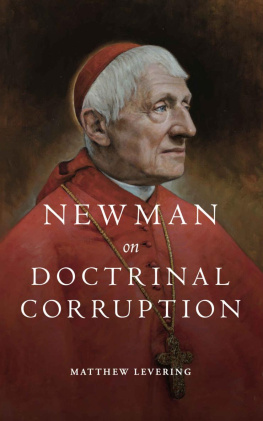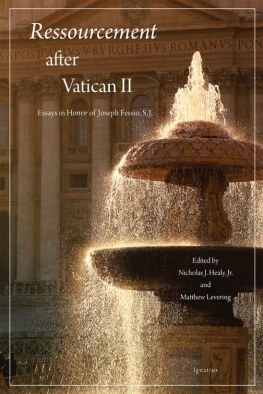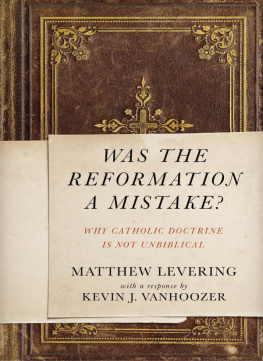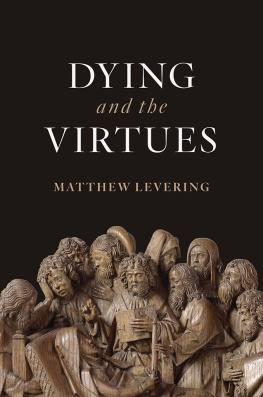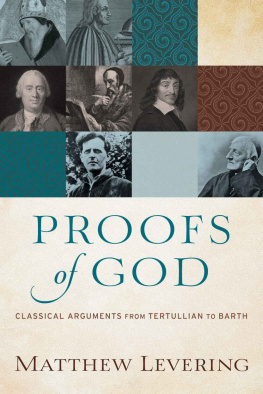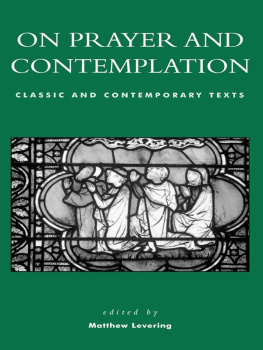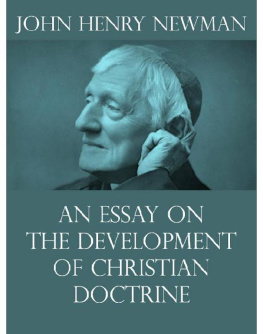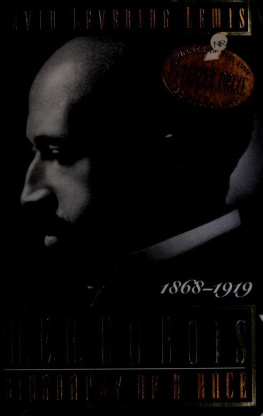Matthew Levering - Newman on Doctrinal Corruption
Here you can read online Matthew Levering - Newman on Doctrinal Corruption full text of the book (entire story) in english for free. Download pdf and epub, get meaning, cover and reviews about this ebook. year: 2022, publisher: Word on Fire Academic, genre: Religion. Description of the work, (preface) as well as reviews are available. Best literature library LitArk.com created for fans of good reading and offers a wide selection of genres:
Romance novel
Science fiction
Adventure
Detective
Science
History
Home and family
Prose
Art
Politics
Computer
Non-fiction
Religion
Business
Children
Humor
Choose a favorite category and find really read worthwhile books. Enjoy immersion in the world of imagination, feel the emotions of the characters or learn something new for yourself, make an fascinating discovery.
- Book:Newman on Doctrinal Corruption
- Author:
- Publisher:Word on Fire Academic
- Genre:
- Year:2022
- Rating:5 / 5
- Favourites:Add to favourites
- Your mark:
- 100
- 1
- 2
- 3
- 4
- 5
Newman on Doctrinal Corruption: summary, description and annotation
We offer to read an annotation, description, summary or preface (depends on what the author of the book "Newman on Doctrinal Corruption" wrote himself). If you haven't found the necessary information about the book — write in the comments, we will try to find it.
Newman on Doctrinal Corruption — read online for free the complete book (whole text) full work
Below is the text of the book, divided by pages. System saving the place of the last page read, allows you to conveniently read the book "Newman on Doctrinal Corruption" online for free, without having to search again every time where you left off. Put a bookmark, and you can go to the page where you finished reading at any time.
Font size:
Interval:
Bookmark:


Published by Word on Fire Academic, an imprint of
Word on Fire, Park Ridge, IL 60068
2022 by Word on Fire Catholic Ministries
Printed in the United States of America
All rights reserved
Cover design, typesetting, and interior art direction by Cassie Pease,
Clark Kenyon, and Rozann Lee
No part of this book may be used or reproduced in any manner whatsoever without written permission, except in the case of brief quotations in critical articles or reviews. For more information, contact Word on Fire, PO Box 170, Des Plaines, IL 60016
or email contact@wordonfire.org
ISBN: 978-1-68578-030-2
Library of Congress Control Number: 2022907604
Table of Contents
Acknowledgments
T his book began with an invitation from the National Institute for Newman Studies to deliver a lecture at a March 2020 symposium. I am especially grateful to Elizabeth Huddleston, Ken Parker, and Bud Marr for this invitation. Although the symposium was shifted to Zoomits date coincided with the week during which school began to be canceled around the country as the severity of Covid became apparentI received helpful feedback from the participants. A much-revised version of my paper was published as Froude, Newman, and Doctrinal Corruption, Newman Studies Journal 18 (2021): 2455. It forms the basis of c hapter 2.
In June 2021, I presented a keynote address on Newman and Dllinger to a conference entitled Development of Doctrine: Revelation, Magisterium, and Human Reason. This conference was sponsored by the Sacra Doctrina Project and was held at St. Bernards School of Theology and Ministry in Rochester, New York. I wish to thank the conference organizers, among them Ryan Brady, Brandon Wanless, and Matthew Kuhner. I am indebted to the participants for a number of important and challenging questions and insights.
The manuscript benefited from the corrections and suggestions made by the two readers for Word on Fire Academic, Benjamin King and Andrew Meszaros. I thank them for the care that they put into this labor and for saving me from some significant mistakes. I gratefully incorporated their insights into the book. Ken Parker and Chris Cimorelli of the National Institute for Newman Studies also provided helpful comments on portions of the m anuscript.
In moving this book toward publication, the staff members of Word on Fire Academic were a delight to work with. I owe particular thanks to Brandon Vogt, Jason Paone, and Matthew Becklo. I am thrilled to be part of helping to launch an academic press associated with the work of Bishop Robert Barron. I wish to thank Dan Seseske, who skillfully copyedited the book; Edyta McNichol, who wrote the index and adapted all footnote citations to Word on Fires in-house style; Madeleine Cook, who proofread the book and caught many typos; and Dr. Marial Corona, who prepared the bibliography. Rozann Lee, Cassie Pease, and Clark Kenyon did exceptional work designing the book and its cover. Christopher Rogers and the library staff at Mundelein Seminary helped me to acquire books, and Mary Bertram has been so supportive of my work in her role as administrative assistant to the Rector of Mundelein Seminary.
My work depends upon the generosity of Jim and Molly Perry, who endowed the chair that I hold at Mundelein Seminary, and whose support has gone far beyond what I could ever have expected. The engine behind my work is my amazing wife, Joy Levering. My life exemplifies the truth of the proverb He who finds a wife finds a good thing, and obtains favor from the Lord (Pr ov 18:22).
I dedicate this book to Elizabeth Huddleston and Alan Mostrom, who helped me so much during my time at the University of Dayton (20092013), and who, in their different ways, embody St. John Henry Newmans spirit. May they and their loved ones b e blessed!
Introduction
R ecent years have seen the appearance of major studies of Newmanian doctrinal development from various perspectives by such scholars as Andrew Meszaros, Christopher Cimorelli, Stephen Morgan, and Reinhard Htter, responding in part to current historicist theological trends.
Today, however, some Catholic theologians toss around the term development with little concern about doctrinal corruption. In some circles, the term development has come to function like a magicians hat that can unproblematically contain almost anything, even including the occasional (or constant!) rupture of solemnly taught doctrine. In such cases, the notion of an apostolic deposit of faith has faded into the mists, to be replaced by the notion that the Church develops doctrine by changing its doctrines to promote a universal religious experience that is expressed differently in every era.
Nothing could be further from Newmans own perspective on Throughout his career, Newman passionately engaged with questions regarding the doctrinal corruption of the apostolic deposit of faith. Indeed, Newmanian doctrinal development cannot be understood outside this context, so caught up was Newman in responding to concerns about doctrinal corruption brought by some of the preeminent Anglican, Protestant, Catholic, and secular thinkers of the eighteenth and nineteenth c enturies.
Bishop Robert Barron aptly associates Newman with the view that one of the surest signs that the faith is developing properly is that Catholics stubbornly think about the data of revelation.
Nevertheless, in 1847 Newmans own brother-in -law, James Mozley, published a scathing book-length review of An Essay on the Development of
I think Newman addresses such concerns about doctrinal corruption far more successfully than Mozley supposes. But the aim of the present book is to place front and center the issue of doctrinal corruption that Mozley identifies and that Newman equally recognizes to be decisive. I explore Newmans responses to five challenges regarding doctrinal corruption, articulated respectively by Edward Gibbon, Richard Hurrell Froude, Francis Newman, Edward Bouverie Pusey, and Johann Joseph Ignaz von Dllinger. Whenever Newman thinks about doctrinal development, he always has the threat of doctrinal corruption in view. This enables his approach to doctrinal development to measure up to the seriousness of the Gospel promise regarding the truth that abides in us and will be with us forever ( 2 John 2).
In our day, as already indicated above, widespread religious liberalism often makes Newmanian doctrinal development seem pass: Newmans claims now appear conservative. Much theological effort today goes into supporting the secular movement du jour, whether it be sexual, ecological, or socioeconomic; and the notion of enduringly true Catholic doctrine is frequently dismissed as nave. Andrew Meszaros observes in his study of Newman and Yves Congar, Contemporary Christian theologyof whatever traditionis increasingly subject to a relativization of do ctrine.
Although the present book will focus with a firmly historical eye on
In notes made while preparing An Essay on the Development of Christian Doctrine , Newman urged that his forthcoming book should be read in conjunction with his Anglican Tract 85, Letters on the Scripture Proof of the Doctrines of the Church (1838). The main theme of his Essay is that true doctrinal development has been sustained in the (Roman) Catholic Church. But one of the Essay s major subplots has to do with No wonder he deems doctrinal corruption of the Gospel to be so serious a threat!
Concerns about doctrinal corruption go back to the New Testament itself. Just to give one example, consider Pauls warning to the Galatians that there are some who are confusing you and want to pervert the gospel of Christ by introducing another gospel (Gal. 1:7). The same concerns about doctrinal corruption are present in the early patristic writings. For
Next pageFont size:
Interval:
Bookmark:
Similar books «Newman on Doctrinal Corruption»
Look at similar books to Newman on Doctrinal Corruption. We have selected literature similar in name and meaning in the hope of providing readers with more options to find new, interesting, not yet read works.
Discussion, reviews of the book Newman on Doctrinal Corruption and just readers' own opinions. Leave your comments, write what you think about the work, its meaning or the main characters. Specify what exactly you liked and what you didn't like, and why you think so.

